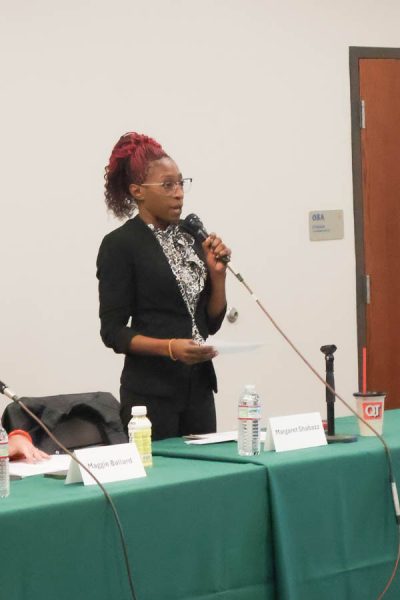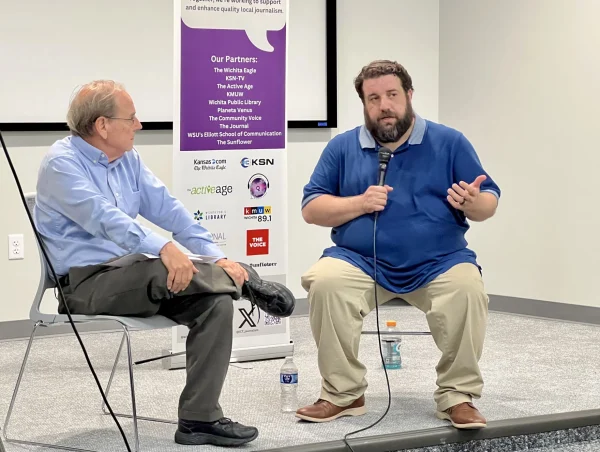Faculty Senate supports ESU faculty facing termination
Nithin Reddy Nagapur / The Sunflower
Chase Billingham, at-large senator and associate professor in sociology talks to the Faculty Senate about the implications of Emporia State University’s plan to terminate tenured professors on Sept. 12.
Wichita State’s Faculty Senate passed a resolution Monday in support of faculty at Emporia State University, following news last week that tenured professors and some degree programs there face possible termination.
The Kansas Board of Regents established a policy in January 2021 that offers new guidelines on the dismissal of tenured faculty without following standard procedures as a COVID response. The policy was originally set to expire on July 1 but was extended to December 2022.
“When this policy was first introduced, it was a major concern on university campuses across the state, including this one,” Chase Billingham, at-large senator and associate professor in sociology, said. “And at that time, none of the university campuses chose to enact that policy.”
ESU administration recently created a plan called the “Framework for Workforce Management” that draws upon KBOR’s policy, involving the termination of tenured faculty. The plan was presented to the board on Wednesday.
“Emporia State announced that they are going to actually submit a proposal to the Board of Regents that will involve termination of tenured faculty,” Susan Castro, Faculty Senate president, said at Monday’s Faculty Senate meeting.
ESU President Ken Hush presented the plan to the board Wednesday afternoon, and it was approved unanimously.
“What’s the choice, charge students more?” Hush said in his presentation to KBOR. “Continually passing the burden to students is a failure of our ESU’s previous strategies and is no longer acceptable.”.
The specifics of ESU’s plan were not disclosed, but, Hush said that the change is needed.
“From that review process, we now have strategic concepts for the programs that we are going to invest in for the future and have identified the programs that we must also move away from,” Hush said. “The faculty and staff followed with the needed program. What’s leftover did not.”
ESU’s plan has been met with backlash from faculty, staff and students at ESU as well as from their peers at other institutions. Much of the upset comes from the fact that ESU’s faculty only had two business days to respond to the plan.
“This particular policy is a solution in search of a problem,” Neal Allen, associate professor in political science, said. “And, it’s worrisome that it could be considered for other institutions.”

ESU’s plan conflicts with the idea of shared governance, a concept that most universities claim to value when making decisions.
“When we talk about shared governance, what we’re talking about is all of the constituencies of the university … having input into the direction that the university wants to go,” Billingham said.
This special workforce management policy is not just available to administrators at ESU but also to the five other state universities in Kansas as well.
“One concern that we’ve had is the fact that this KBOR policy was already set to sunset once and it was extended, so given that precedent, it’s certainly possible that in the future, it could be extended again, or perhaps even indefinitely,” Billingham said. “Even though … the administration has been very good for us here at WSU on that issue, there’s no guarantee that a future administration at this university might not try something similar (to ESU).”
Additionally, many believe that ESU’s plan devalues education/educators.
“We are able to attract really highly talented scholars here, really highly talented teachers here,” Billingham said. “And part of the way that we’re able to do that is by offering them the freedom to engage in the types of research that they want to pursue to create new ideas and to discover new things.”
Tenure offers professors more freedom and security to focus on their research. Receiving tenure is not an easy process, and often takes five or more years of working with a specific institution to achieve.
“All Kansas public universities will have a harder time recruiting excellent faculty because we’re in a national job market, and tenure is part of a standard compensation package for university faculty,” Allen said. “We will have a hard time recruiting excellent faculty because other states will have a competitive advantage over us.”
The Faculty Senate met Monday to discuss many agenda items, one being the ongoing situation at ESU. At the meeting, they established a resolution in support of Emporia’s faculty who face possible termination.
“We urge the leadership of Emporia State to work with faculty to find alternative responses to ongoing financial challenges that predate the Covid 19 pandemic and instead utilize established financial exigency policies,” a portion of the resolution stated.
The resolution also highlights the time and commitment tenured faculty go through and thanks WSU’s administration for its management of fiscal matters.
ESU faculty facing termination will keep their positions until May 2022.
Students enrolled in majors facing cuts will be able to complete their degrees through an alternate program. ESU has not released the full details of what this would look like.
This story has been updated from a previous version.

Mia Hennen is the managing editor for The Sunflower. Most recently, Hennen served as editor-in-chief for the 2023-2024 year. A senior English major, Hennen...












